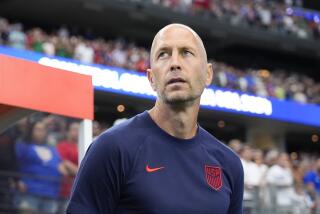WORLD CUP ’90 : Goycochea Becomes Name to Remember
- Share via
NAPLES, Italy — Who, anywhere in Argentina, from the highest hill of the Andes to the flattest part of the Pampas, ever would have guessed that the greatest thing that could happen to soccer’s reigning kings--the lucky break that could give the Argentines a chance to keep their precious Cup--was that their goalkeeper would break his leg?
It sure did develop into a star-is-born, send-in-the-understudy story for Sergio Javier Goycochea, 27, who replaced Argentina’s original goalkeeper a week into the World Cup tournament, with virtually nothing to recommend his being here at all, and suddenly has become his side’s most valuable player.
Tuesday, after a 1-1 draw led to a riveting penalty-kick shootout, which Argentina won, leaving more than just the landmarks of Italy in ruins, the man whose name was being discussed or cursed, not to mention mispronounced, by many of the 59,978 filing out of Stadio San Paolo was not Diego Maradona, the Argentine idol, but Goycochea, who batted away back-to-back, point-blank shots in the shootout to put his country, quite unexpectedly, into Sunday’s final.
“It is unbelievable for me to be playing here,” Goycochea said afterward.
More than three weeks ago, Argentina kicked off World Cup competition with an ego-deflating 1-0 loss to Cameroon, embarrassing partly because the winners were two players short at game’s end because of expulsions, but also because the game’s only goal slipped through the fingers of Nery Pumpido, the normally sure-handed goalkeeper. Cameroon’s shot was a dribbler that Pumpido ordinarily could stop in his sleep.
After that, his luck did not improve. Pumpido was carried off the field in Argentina’s next game with a broken leg. And the coach, Carlos Bilardo, was forced to turn to the inexperienced Goycochea, who some back home considered to be no better than Argentina’s fourth-best goalkeeper.
“I was not surprised that Carlos picked me to come, because he knows me very, very well,” Goycochea said. “But I did have a few doubts about my own play.”
For one thing, a bad shoulder kept Goycochea out of action last year for close to six months. Then, when he was pronounced fit for duty in a league in Colombia, the strangest thing happened: The season was canceled after a few weeks because one of the league’s referees, in an incident that led to accusations of involvement by organized crime, was found murdered.
So, the goalie remained pretty much inactive. And though Goycochea fantasized about the World Cup, imagining himself doing the very same things his boyhood hero Ubaldo Fillol did in goal when Argentina won the 1978 championship, the fact remained that Pumpido would get the first call.
Then some breaks began to come his way. Argentina’s No. 2 goalkeeper announced that he did not care to go to the Cup unless he was promoted to No. 1. The coach had his own ideas. A third goalie had far more international experience, but Bilardo thought him to be a bit too old. Besides, he doubted Argentina would even need a backup in Italy, as long as Pumpido would be around.
As recently as the last half of June, even the great Maradona expressed public doubts that Argentina had the necessary talent to repeat as World Cup champion. “We should not hide the fact that we are not at the same level as Italy, Brazil and West Germany,” Maradona said as he and his teammates limped into the later rounds.
How this tune has changed. Where once he claimed it would take a miracle to get past Brazil, Maradona said Tuesday: “Today was not a miracle, because Argentina was really fit this time, really prepared to play. We could talk about a miracle before the match, but not now, not after.”
Nobody looked more fit than Goycochea, who sent his body hurtling through space, with only a split-second to decide in which direction, to save the day for Argentina. Not just in the shootout, either. In the first overtime period, Italian superstar Roberto Baggio kicked a wicked liner that was headed into the top of the net until Goycochea leaped and finger-tipped it over the crossbar.
Then came the shootout, in which his timing was superb.
After missing the first one, Goycochea got a hand on Baggio’s line drive to his right, and just missed keeping it from crossing the line. He thanked Maradona for a tip on how Baggio would approach the shot, but admitted that about all a goalie can do is dive and pray, because: “You cannot think in those moments. There is no time.”
Up stepped Italy’s Luigi De Agostini for Italy’s third attempt, and he, too, was successful. But Roberto Donadoni was not, aiming to the left of the goalie, who guessed correctly and knocked it away. And then, after Maradona put Argentina ahead, Goycochea hunched down low for Aldo Serena’s shot, blocked it and won it.
Tens of thousands of Italians sat frozen in their seats, unwilling or unable to move.
The World Cup had been one big party up to now, with every one of the host team’s previous games played in Rome and every one won by shutout. Night after night, songs were sung, horns were honked and wines were drunk.
The last thing the soccer lovers of Italy expected was to lose to somebody named Sergio Goycochea. Few of them had ever heard of anybody named Goycochea, fewer could pronounce it, and even fewer, by night’s end, cared to try.
More to Read
Go beyond the scoreboard
Get the latest on L.A.'s teams in the daily Sports Report newsletter.
You may occasionally receive promotional content from the Los Angeles Times.







